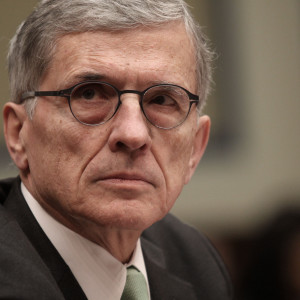Two former chief economists at the Federal Communications Commission highlighted Monday what they describe as a growing trend of absentee economics at the agency under Chairman Tom Wheeler, who led the agency’s landmark adoption of net neutrality rules last year.
Those rules like many others since in the business broadband, data privacy and TV set-top box market were advanced without any prior economic analysis on their potential impact — a departure from some 30 years of prior agency rulemaking, and one that threatens to set a dangerous policy precedent, according to former FCC chief economists Gerald Faulhaber and Tim Brennan.
“In the Wheeler era, economics at the FCC has basically sunk like a stone,” Faulhaber, who was appointed chief economist at the FCC in 2000, said during a panel at George Washington University Monday, adding there’s no better example than the 2015 Open Internet Order.
“The most important order they’ve issued in a decade — two decades — at least,” he continued, “and they said, ‘Well, we don’t have to do a cost-benefit analysis.'”
Brennan, who served under Wheeler, described his former role at the agency as akin to working in a broom closet-sized office where he was rarely consulted, and said decisions at the eighth floor aren’t made with a substantial amount of economic input.
“If the FCC wants to do something, it apparently has to squeeze them into economics boxes, and I think the process of that squeezing is why you get economics that doesn’t, in some cases, look very good,” Brennan said.
Noted telecom economist Hal Singer, a professor at the Georgetown McDonough School of Business, said the dismissal of economics was particularly noteworthy with regard to the ban on paid prioritization — one of the three bright line rules contained in the order along with bans on content blocking and throttling.
Instead of analyzing whether a case-by-case approach to examining the fairness of deals like those brokered between Netflix and Verizon for faster video streaming, the commission eventually chose an outright ban on such agreements, describing them as too cumbersome to adjudicate without including any analysis explaining why.
“If it turns out that we try case-by-case adjudication of these disputes and they’re too cumbersome, they take too long to adjudicate, there’s harm, content gets discouraged as a result, then I could be convinced that a ban would be appropriate,” Singer said. “But the way that we got here did a disservice to economics.”
Monday’s panel was timed with the release of a study by Singer and Faulhaber, a professor at the Wharton School, University of Pennsylvania, examining the trend, which they predict will chill innovation in the rapidly expanding online media and communications markets.
“The FCC threatens this innovative arc as it lashes about for a new mandate,” the study sponsored by CALinnovates, a policy advocacy group representing tech companies, reads. “It is time for a rebirth of economics at the FCC. Based on our diagnosis of what ails the agency, Congress will have to right this ship.”
The economists said the pace of innovation in such technology largely absent regulation before the net neutrality order left the agency searching for relevancy, resulting in its seizure of authority over internet providers from the Federal Trade Commission.
Faulhaber and Singer conclude Congress should mandate the FCC conduct economic analyses before implementing rulemakings like the pending proposals to limit internet service providers’ use of customer data or opening the pay-TV providers’ content to third-party set-top boxes — a suggestion hundreds of Republicans and Democrats in both chambers have already put forth.
Harold Feld, the often publicly vocal senior vice president of Public Knowledge — one of the leading D.C. advocacy groups that lobbied heavily in favor of net neutrality — said they agency did make economic considerations while drafting net neutrality and other rules, but that they were discounted by Monday’s trio of “right-leaning” economists because they disagree with the rules themselves.
“I think there is a difference between saying the FCC is an ‘economics-free zone’ and saying that they use economic methodologies that you personally do not like, and do not regard as legitimate,” Feld said.
The Public Knowledge vice president said much of that analysis took place in 2010 when the FCC’s initial net neutrality rules forbearing from Title II regulation were defeated in court, prompting the agency to consider Title II without rate regulation to avoid any harmful economic impact.
“The manufacture of this as Tom Wheeler as some sort of mad FCC Robespierre with his citizens committee of Commissioner Clyburn and Commissioner Rosenworcel decapitating innocent corporations in the name of populist outrage makes for a charming picture, and I have no doubt is generally shared by people who enjoyed policy dominance in the previous decade who now wonder that the world has changed,” Feld said.

